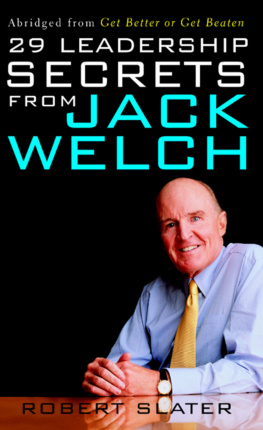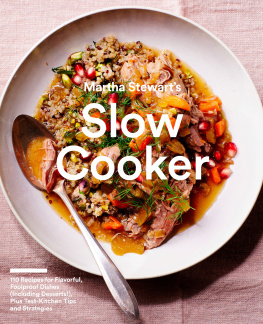Martha
On Trial, in Jail, and on a Comeback
Robert Slater

Library of Congress Cataloging-in-Publication Data
Slater, Robert, 1943
Martha : on trial, in jail, and on a comeback / Robert Slater.
p. cm.
Includes bibliographical references and index.
ISBN 0-13-187514-0 (hardback : alk. paper)
1. Stewart, Martha. 2. Home economists--United States--Biography.
I. Title.
TX140.S74S77 2006
338.7'6164092--dc22
[B]
2005032631
Vice President and Editor-in-Chief: Tim Moore
Editorial Assistant: Susan Abraham
Development Editor: Russ Hall
Director of Marketing: Amy Neidlinger
International Marketing Manager: Tim Galligan
Cover Designer: Chuti Prasertsith
Managing Editor: Gina Kanouse
Senior Project Editor: Kristy Hart
Copy Editor: Water Crest Publishing
Proofreader: Debbie Williams
Senior Indexer: Cheryl Lenser
Interior Designer: Gloria Schurick
Compositor: Gloria Schurick
Manufacturing Buyer: Dan Uhrig

2006 by Pearson Education, Inc.
Publishing as Prentice Hall
Upper Saddle River, New Jersey 07458
Prentice Hall offers excellent discounts on this book when ordered in quantity for bulk purchases or special sales. For more information, please contact U.S. Corporate and Government Sales, 1-800-382-3419, .
For sales outside the U.S., please contact International Sales, 1-317-581-3793, .
Company and product names mentioned herein are the trademarks or registered trademarks of their respective owners.
All rights reserved. No part of this book may be reproduced, in any form or by any means, without permission in writing from the publisher.
Printed in the United States of America
First Printing January 2006
ISBN 0-13-187514-0
Pearson Education LTD.
Pearson Education Australia PTY, Limited.
Pearson Education Singapore, Pte. Ltd.
Pearson Education North Asia, Ltd.
Pearson Education Canada, Ltd.
Pearson Educatin de Mexico, S.A. de C.V.
Pearson EducationJapan
Pearson Education Malaysia, Pte. Ltd.
Acknowledgments
In March 2004, Martha Stewart mentioned to Larry King that she thought it could be helpful to others for her to write a book about her legal case "just about what lawyer to choose, how to behave, how to attend an interview. There's no how-to book about thisfor anybody who has to go through this process, there should be some guidelines because guidelines would help."
When I read that part of the King-Stewart interview as part of my research for Martha: On Trial, in Jail, and on a Comeback , I realized that, although I was also writing a book about her legal case, my goal was entirely different from Stewart's. I was not writing a how-to book. I wanted to write a narrative about one of the most fascinating legal cases of our era, a case that turned America's most famous woman into its most infamous.
I focused on Stewart's legal case for a number of reasons: First, while I had written numerous book-length profiles of American business leaders (Jack Welch, Bill Gates, Lou Gerstner, Donald Trump, etc.), it hardly seemed appropriate to write a business profile of Martha Stewart after all of her legal troubles. She had certainly achieved a great deal as a businesswoman; but it was impossible to write about her continuing business accomplishments after her legal turmoil had put her businesses into disarray.
Second, two previous books on Stewart had covered her life in full and done so with strong negative slants. I did not want to rehash her entire life; nor did I want to produce a negative book about Stewart. Focusing on her legal travails afforded me the opportunity to write about the greatest crisis in her life and career, showing how she had gone through that crisis and had then staged one of the great comebacks of American life.
To research the book, I spoke with numerous people who had something to do with Martha Stewart from the day she took the controversial stock tip on December 27, 2001, to the present: her lawyers and lawyers of others involved in her trial; her public relations advisers and public relations advisers to others involved in her trial; and members of the media who covered the trial. I spoke with people who were familiar with Martha Stewart's experience while she was in jail. I also spoke to a number of Martha Stewart supporters and critics to get a flavor of the kind of emotions whipped up by the trial.
I made a number of attempts to speak with Martha Stewart, and the closest I came were three phone conversations with her spokeswoman, Susan Magrino. In each of the calls, Ms. Magrino grilled me extensively on what the book would be about, whether Martha Stewart would enjoy reading it, and would she feel she had been accurately and fairly portrayed. I took each phone call as a sign that I was getting closer to interviewing Ms. Stewart; but alas no interview took place. It did not surprise me. Martha Stewart had given relatively few interviews to the media from the time she was released from jail in March 2005 to the present. She had barely touched on her legal case in interviews dating back to 2002. Her book, Martha's Rules , was due to be published in October of that year. I assumed that after it became clear to Ms. Magrino that I intended to focus on the years of Martha Stewart's legal case, I would have a more difficult time getting the interview because Stewart did not want to discuss that period.
The nature of my research led me to interview many people connected to the case off the record. I was not able to quote them in the book. Nor can I mention their names in these Acknowledgments. I wish to thank them for their help and for their candor.
I do want to thank those who talked to me either fully on the record or largely on the record: Dan Ackman; Douglas Arthur; Kurt Barnard; Kevin Coupe; Howard L. Davidowitz; Lanny Davis; Allen Dodd-Frank; Jim Dowd; Ivan Feinseth; Burt Flickinger; Chrisa Gonzales; Kate Hazelwood; Gordon Joseloff; Elizabeth Koch; Elaine Lafferty; Helen Lucaites; Tom Madden; Lisa Marsh; Dennis B. McAlpine; Gary McDaniel; Lawrence McNaughton; Denise Miller; Peter Montoya; Kevin B. O'Neill; Laurel Parker; Robert K. Passikoff; Stacy Perman; Marvin Pickholz; Penelope Patsuris; Andrew Ritchie; Howard Rubenstein; Seth Siegel; Michelle Soudry; Rochelle Steinhaus; Donald Trump; Troy Wolverton; Nat Worden; and Jacob (Jake) H. Zamansky.
I also want to thank the following for help they gave during the project: Judith Resnik; Dennis Curtis; David Nachman; Amy Shulman; Allen Alter; Michael and Bobbi Winick; Marco Greenberg; Gershon Kekst; and Lissa Perlman.
I want to especially thank Jacob (Jake) H. Zamansky, the securities attorney who attended the Martha Stewart trial every day. He was kind enough to answer my questions on a continuing basis during my research, shedding much light on the intricacies of the case.
I also want to thank Andrew Ritchie, a Canadian journalist who writes often for the SaveMartha.com Web site. Mr. Ritchie constantly supplied me with material that he felt would be of interest to me. I also benefited from numerous insights he made about Ms. Stewart and her legal case.
I want to thank Elizabeth Koch for agreeing to be interviewed; and for allowing me to quote from the notes she took during the Martha Stewart trial, notes that appear on the Reason.com Web site, for which she wrote during the trial.
As usual, the most help that I received for this project came from the closest members of my family: my wife, Elinor; my children: Miriam, Adam, and Rachel; Shimi and Tal; and my grandchildren: Edo, Maya, and Shai, I thank them for providing the encouragement as well as the peace and quiet that enabled me to produce this book.








